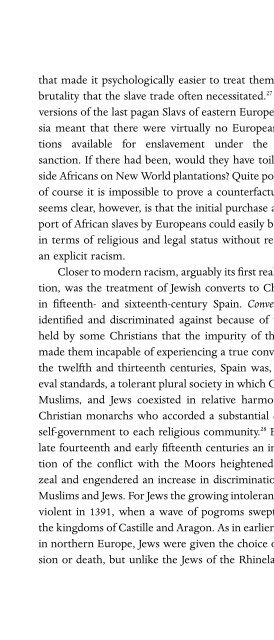Racism - A Short History - George M Fredrickson.pdf - WNLibrary
Racism - A Short History - George M Fredrickson.pdf - WNLibrary
Racism - A Short History - George M Fredrickson.pdf - WNLibrary
Create successful ePaper yourself
Turn your PDF publications into a flip-book with our unique Google optimized e-Paper software.
TWO The Rise of Modern <strong>Racism</strong>(s)<br />
but that their heads should be cut off in one night and<br />
replaced with others not containing a single Jewish idea.” 36<br />
Historian Peter Pulzer has incisively described the essence<br />
of the Jewish question in nineteenth-century Germany:<br />
“Those who governed Germany, and those who strongly<br />
influenced public opinion, could not decide between the<br />
insistence that Jews should assimilate more and the conviction<br />
that they were incapable of ever doing so.” 37<br />
The growth of a firm conviction on the part of some<br />
Germans that assimilation was impossible was the mainspring<br />
of the antisemitic racism that developed after German<br />
unification in 1870. Explicit biological racism was not<br />
applied to Jews in Germany until well after it had been<br />
invoked to rationalize white American attitudes toward<br />
blacks. The older tradition of antisemitism, which stressed<br />
cultural differences and, at least in theory, made conversion<br />
to Christianity the miraculous cure for Jewishness, survived.<br />
For a time an expectation of full Jewish inclusion in<br />
German life was reinforced by the liberal conception of<br />
the state as guarantor of individual rights, a viewpoint that<br />
competed with the more mystical and authoritarian conceptions<br />
of the state that eventually triumphed. A transitional<br />
figure who embraced the coercive, culturally intolerant,<br />
and increasingly pessimistic assimilationism that served<br />
as a segue between the old religious intolerance and the<br />
new racism was the famous professor and public intellectual<br />
Heinrich von Treitschke. When he wrote in 1879 that<br />
“the Jews are our misfortune,” he was referring mainly to<br />
an influx of culturally alien immigrants from Poland rather<br />
than to the German-born Jews who he thought still might<br />
be turned into good subjects of the Reich. 38<br />
72
















